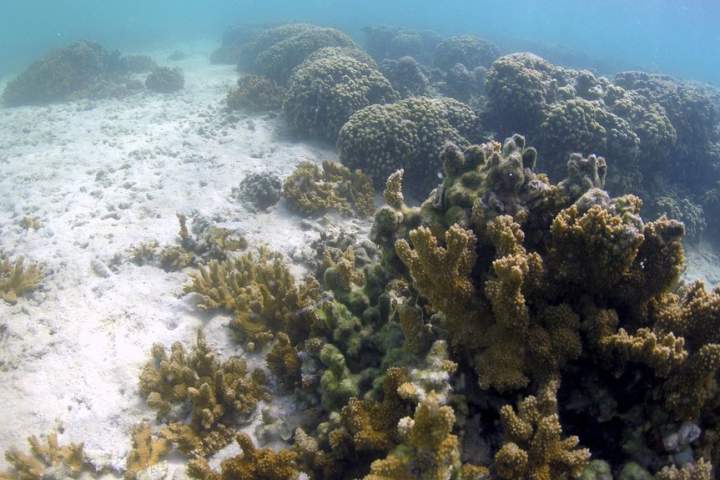Science
Coral Reefs Near Irreversible Die-off Amid Climate Crisis

Global warming poses an immediate threat to the world’s coral reefs, with scientists warning that these vital ecosystems are nearing an “almost irreversible die-off.” This alarming conclusion comes from the latest Global Tipping Points report, which synthesizes research from **160 scientists** worldwide. The findings highlight a critical threshold in climate-driven ecosystem collapse, coinciding with the upcoming **COP30** climate summit scheduled for December 2023 in Brazil, near the Amazon rainforest.
The report indicates that the Amazon rainforest itself is at risk of collapse, particularly if average global temperatures exceed **1.5 degrees Celsius** above preindustrial levels. The threshold for the Amazon has been revised downward due to ongoing deforestation, making urgent action more vital than ever. Furthermore, the report warns about the potential disruption of the **Atlantic Meridional Overturning Circulation (AMOC)**, a key ocean current that plays an essential role in regulating winter temperatures in northern Europe.
Tim Lenton, an environmental scientist at the University of Exeter and lead author of the report, expressed concerns about the rapid pace of climate change. “Change is happening fast now, tragically, in parts of the climate, the biosphere,” he stated. Despite the grim outlook, Lenton pointed to some positive developments in renewable energy. Data from the nonprofit think tank **Ember** shows that renewables generated more electricity than coal in 2023 for the first time.
While the report stresses the urgent need for countries to cut climate-warming carbon emissions, it also emphasizes that there is still time to act. “Nobody wants to be just traumatized and disempowered,” Lenton noted. “We still have some agency.”
The scientific community has been taken aback by the swift changes in climate. Current estimates indicate that average global temperatures have already risen by **1.3 to 1.4 degrees Celsius** compared to preindustrial averages, according to data from **U.N.** and **EU** scientific agencies. Alarmingly, the last two years have been recorded as the warmest on Earth, leading to marine heatwaves that have stressed **84 percent** of the world’s coral reefs, resulting in widespread bleaching and mortality.
Coral reefs, which support approximately a quarter of all marine life, face an uphill battle for recovery. The scientists assert that reversing the trend requires a substantial reduction in temperatures to just **1 degree Celsius** above preindustrial levels. “The new report makes clear that each year there is an increase in the scope and magnitude of the negative impacts of climate change,” said **Pep Canadell**, a senior scientist at Australia’s **CSIRO Climate Science Centre**.
Currently, global policies are on track for an alarming increase of about **3.1 degrees Celsius** in warming by the end of the century, underscoring the urgent need for decisive climate action. The findings in the Global Tipping Points report serve as a sobering reminder of the delicate balance of our ecosystems and the dire consequences of inaction. As the world approaches critical climate summits, the call to prioritize environmental sustainability has never been more pressing.
-

 Science2 months ago
Science2 months agoToyoake City Proposes Daily Two-Hour Smartphone Use Limit
-

 Health2 months ago
Health2 months agoB.C. Review Reveals Urgent Need for Rare-Disease Drug Reforms
-

 Top Stories2 months ago
Top Stories2 months agoPedestrian Fatally Injured in Esquimalt Collision on August 14
-

 Technology2 months ago
Technology2 months agoDark Adventure Game “Bye Sweet Carole” Set for October Release
-

 World2 months ago
World2 months agoJimmy Lai’s Defense Challenges Charges Under National Security Law
-

 Technology2 months ago
Technology2 months agoKonami Revives Iconic Metal Gear Solid Delta Ahead of Release
-

 Technology2 months ago
Technology2 months agoSnapmaker U1 Color 3D Printer Redefines Speed and Sustainability
-

 Technology2 months ago
Technology2 months agoAION Folding Knife: Redefining EDC Design with Premium Materials
-

 Technology2 months ago
Technology2 months agoSolve Today’s Wordle Challenge: Hints and Answer for August 19
-

 Business2 months ago
Business2 months agoGordon Murray Automotive Unveils S1 LM and Le Mans GTR at Monterey
-

 Lifestyle2 months ago
Lifestyle2 months agoVictoria’s Pop-Up Shop Shines Light on B.C.’s Wolf Cull
-

 Technology2 months ago
Technology2 months agoApple Expands Self-Service Repair Program to Canada









